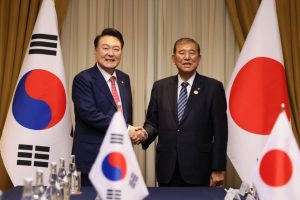South Korean President Yoon Suk-yeol’s botched attempt to impose martial law and the following political turmoil are beginning to have a negative impact on the progress of improving Japan-South Korea relations, which had been made based on the personal relationship between Yoon and former Japanese Prime Minister Kishida Fumio.
The political chaos in Seoul is also casting dark clouds over the Japan-South Korea-U.S. trilateral security cooperation that the Biden administration in the United States has strongly promoted.
Public outrage at Yoon’s martial law gambit is so strong that the president has lost the support of the people, and his administration is virtually coming to an end. An impeachment vote is set for December 7.
There are already some negative signs that the turmoil is reversing the improvements in Japan-South Korea relations and the trilateral ties among Tokyo, Seoul, and Washington.
In the wake of South Korea’s martial law backlash, a planned visit to Seoul by a Japanese parliamentary delegation, led by former Prime Minister Suga Yoshihide, has been cancelled.
Japan’s Defense Minister Nakatani Gen also postponed his planned visit to Seoul later this month. Prime Minister Ishiba Shigeru’s visit next month is also looking more difficult. If Yoon is indeed impeached, South Korea will have only an acting president for months as the country waits for the impeachment to be scrutinized by the Constitutional Court. Only then would a special election install a new president.
There is growing concern within the Japanese government that the political unrest in Seoul could reverse its course of improving relations with Tokyo.
What is most shocking for Tokyo is the content of the impeachment motion submitted by South Korea’s six opposition parties to the National Assembly on December 4. The conclusion of the motion reads as follows:
In addition, under the guise of so-called “value diplomacy,” Yoon has neglected geopolitical balance, antagonizing North Korea, China, and Russia, adhering to a bizarre Japan-centered foreign policy, and appointing pro-Japan individuals to key government positions, thereby causing isolation in Northeast Asia and triggering a crisis of war, abandoning his duty to protect national security and the people.
This part suggests what kind of foreign and security policies Lee Jae-myung, the leader of South Korea’s largest opposition Democratic Party, would pursue if he were to become the next president – the most likely outcome if Yoon is impeached.
The political convulsion in Seoul also came amid an important time for the Japan-South Korea-U.S. trilateral. U.S. Secretary of Defense Lloyd Austin is about to visit Japan and South Korea to mutually confirm the irreversible trilateral cooperative relationship. It could be the last such exchange before the inauguration of President-elect Donald Trump in January next year, who advocates America First and discounts U.S. allies and alliances.
Now, Austin will only travel to Tokyo, having reportedly canceled his visit to South Korea.
At such a critical time, it would be a heavy blow to Japan if the pro-Japan Yoon administration were to lose power. Under ordinary circumstances, Ishiba and Yoon would have been working on the critical task of persuading Trump of the strategic importance of Japan-South Korea-U.S. cooperation, particularly in the midst of a confrontation with unruly North Korea.
The Treaty on Comprehensive Strategic Partnership between North Korea and Russia just came into effect on December 4, elevating their bilateral relationship to a de facto military alliance.
As the world becomes increasingly divided and tense, it seems likely that Japan, the United States, and other countries will be forced to pay close attention to the direction of South Korea’s diplomatic and security policies for some time to come.
It is true that there is growing concern that a period of winter-like hardship is coming for Japan-South Korea relations if Yoon is impeached and the next administration is a progressive one.
But Keio University law professor Nishino Junya, a leading expert on Japan-South Korea relations, doesn’t think that kind of situation will necessarily happen right away.
“Several factors are different from the past,” Nishino pointed out.
First, Nishino said the international situation has become more severe than ever before, and the need for Japan and South Korea to cooperate has become greater than ever before.
Second, Nishino said relations between the former Moon Jae-in administration and the former Abe Shinzo administration were bad due to a lack of political chemistry. However, Japan’s current prime minister, Ishiba, has placed a great deal of importance on Japan-South Korea relations.
Finally, Nishino pointed out that whether the progressive forces led by Lee Jae-myung will necessarily win an easy victory in South Korea’s next presidential election will depend on who appears in the presidential election as candidates and how the election will be structured.
In any case, in the near future, with an eye on the birth of a progressive government in Seoul, Japan and the United States will have to take the lead in increasing their deterrence and response capabilities in the region. The South Korean government has become dysfunctional since the martial law declaration.

































